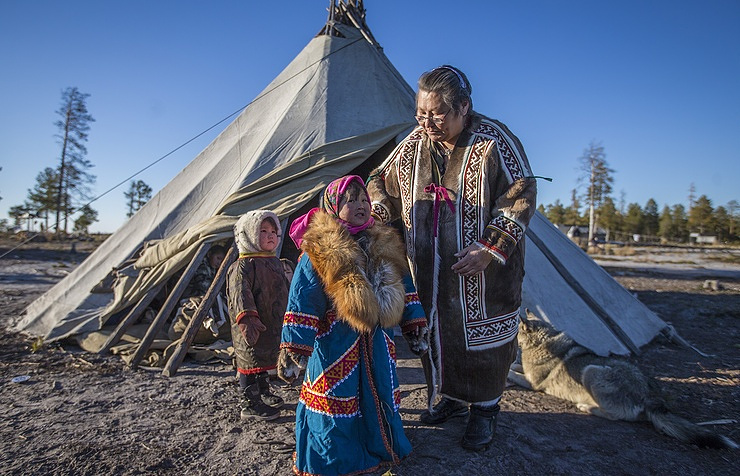Arctic tourism, North culture to be on agenda of Eastern Economic Forum

KRASNOYARSK, September 8. /TASS/. From the development of tourism in the Arctic regions will favor the preservation in Russia of the North's indigenous peoples' culture, which already has been lost in the world. This topic will be on agenda of the upcoming Eastern Economic Forum.
On September 5, Russian President Vladimir Putin at a meeting on development of Far Eastern cities said the unique nature in the Magadan Region, Chukotka and Yakutia could attract many tourists.
According to Valery Vengo, Vice-President of the Association of Indigenous Peoples of the North, Siberia and the Russian Far East, it is equally important to develop tourism in the Arctic in order to preserve the culture of the North's indigenous peoples. "Everything national, aboriginal has been lost almost everywhere [in the world], except for the Russian Federation. We have the same reindeer herders - they are roaming like they did 5,000 years ago. The idea is to preserve this unique primitive culture of the indigenous peoples for future generations. <...> One of the solutions to preserve and promote it is to include the culture of these peoples in the tourist product. For example, when touring Egypt, we are brought to the Bedouins [on excursions] for money and we are surprised to see everything preserved there. At the same time, very few know what exists in the Russian territory," he said.
Ethnic villages and auto expedients
There are 40 indigenous peoples of the North, Siberia and the Far East living in Russia. In the Krasnoyarsk Region only, there are about 17,000 people of eight ethnic groups that mainly live on the Taymyr Peninsula - the Nganasans, Ents, Nenets, Evenks, Dolgans, Keto, Chulyms, Selkups. According to Vengo, ethnic villages could be an option to preserve and promote the culture of the North's indigenous residents. "Those are ethnographic tourist complexes, organized for tourists in the locations where the indigenous peoples live. Visitors can see their everyday life, can learn about their crafts. The local population could organize their small businesses and sell something to tourists," the expert said.
A village of the kind opened in the spring of 2023 in the Krasnoyarsk Region's Surinda village, where the Evenks live. "There are tents covered with deer skins, a kiosk, a corral for domestic deer, a platform for the Evenks' rituals and concerts, as well as applied arts workshops, and workshops to process meat, berries and nuts," said press service of the region's agency for the development of northern territories and support of indigenous minorities.
In such a village, tourists may stay in a real tent (chum), may attend masterclasses in deer riding, in bead embroidery, cooking of national dishes, and in the Evenk language. Another similar village is due in the Krasnoyarsk Region's Khatanga. "A new hotel has been built there, and now they are working on new tourist facilities, and will make an ethnic village, and a folk arts center," Igor Spiridenko, chairman of the Russian Geographical Society's Krasnoyarsk Branch, told TASS.
Arctic tourism
Auto expeditions are the key direction in Yakutia's developing Arctic tourism. The Sakha Arctic Expedition was organized for the first time in the past winter, the region's tourism authority told TASS. A team, led by experienced guide Mikhail Mestnikov, set off in two cars across six Yakut districts, including four Arctic districts. They have covered more than 4,800 km between Yakutia's two poles of cold - Oymyakon and Verkhoyansk, known worldwide for their freezing temperatures.
The travelers have learned the local history, took part in various events, and received detailed information about the culture and everyday life of the North's indigenous peoples. At the Verkhoyansk - Pole of Cold festival they tasted delicacies and visited exhibitions, climbed the Kisilyakh Mountains, took part in the reindeer herders' festival in the village of Topolinoe, the tourism authority said.
The project was supported by Yakutia's Hospitality Association, the Tourism Industry Association, and the Ministry of Entrepreneurship, Trade and Tourism. "We will use analytical data, based on the auto expedition, to offer guidelines to improve the tourist potential quality and to pack tourist products for visiting tourists. Generally speaking, the project will open the Arctic doors to tourists from across the world," the region's tourism agency said.
Arkady Dorofeev, executive director of Yakutia's Tourism Industry Association, added the auto expedition would be an annual event with various additional options.
The 8th Eastern Economic Forum (EEF) will be held in Vladivostok on September 10-13, 2023. The slogan for this year’s forum is: On the Path to Partnership, Peace and Prosperity. The Roscongress Foundation is the event organizer. TASS is the forum's general information partner.
Photo by Sergey Bobylev/TASS





